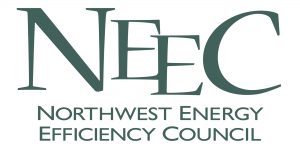The state legislatures in Washington and Oregon are set to convene next month amid depressing state budget news. The two year biennium in Oregon (beginning July 1, 2011) has a projected deficit well north of $3B. Washington State fares little better with that state’s projected biennial shortfall at $4.6B. (Gov. Chris Gregoire has submitted her budget to the Legislature – details can be seen at www.ofm.wa.gov. Clearly, the dominant conversation in both states will be focused on “resetting” state spending.
Energy efficiency will be a legislative discussion in both states however, and NEEC is working with our governmental affairs representatives on a number of key policy fronts. In Oregon, we expect an active EE legislative calendar. NEEC’s top priorities include;
- Extending authorization of the Business Energy Tax Credit (BETC) for energy efficiency investments. The BETC, first introduced in Oregon to stimulate energy efficiency, has endured recent controversy in its application to renewable energy projects. Revisions to the BETC are anticipated, but NEEC will be working hard to preserve the tax credit for energy efficiency.
- Protecting the Energy Trust of Oregon. The popular and effective Energy Trust is perennially a target for budget raids. NEEC will join a strong coalition of other energy interests working to ensure the financial integrity of the Trust.
- Energy Performance Disclosure regulations have been enacted by states such as California, Washington and a number of municipalities. NEEC hopes that Oregon will adopt similar requirements. Providing consumers, tenants, lenders, and buyers with an energy performance score for residential and commercial properties, through a performance disclosure requirement, will focus the market on opportunities to improve building energy management.
- K-12 school energy efficiency was a plank in incoming Gov. John Kitzhaber’s campaign and NEEC supports a strong targeted investment in public schools throughout Oregon as a means to reduce school operating costs, improve their indoor environmental quality, and stimulate construction jobs in communities across the state.
- An energy efficiency prioritization standard would restore the three decade long “loading order” for new resources for the state’s utilities. Such a standard would require utilities to look at inexpensive conservation resources as the priority resource for future needs. Cost effective energy efficiency would be recognized as providing the cheapest and cleanest Oregon energy future.
In Washington State, NEEC is expecting a more modest energy efficiency legislative agenda. NEEC priorities for legislative attention are;
- Changes to the I-937 statute which would allow utilities to use any energy efficiency acquired beyond their biennial target to count toward meeting their renewable energy portfolio standard.
- IOU utility rate reform may or may not get legislative attention this year, but NEEC believes that meaningful regulatory reform is needed to remove current disincentives for regulated utilities to aggressively pursue energy efficiency resources beyond that required by I-937.
During the legislative session, NEEC will reactivate the web link on its home page for bill tracking in both legislatures. Webinar updates by our governmental affairs teams will be scheduled throughout the sessions to provide members with up to the minute reports on legislative items of interest.
